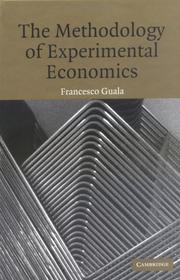| Listing 1 - 8 of 8 |
Sort by
|
Book
ISBN: 9780691171784 0691171785 0691242356 1400880912 Year: 2016 Publisher: Princeton (N.J.): Princeton university press,
Abstract | Keywords | Export | Availability | Bookmark
 Loading...
Loading...Choose an application
- Reference Manager
- EndNote
- RefWorks (Direct export to RefWorks)
Understanding Institutions proposes a new unified theory of social institutions that combines the best insights of philosophers and social scientists who have written on this topic. Francesco Guala presents a theory that combines the features of three influential views of institutions : as equilibria of strategic games, as regulative rules, and as constitutive rules. Guala explains key institutions like money, private property, and marriage, and develops a much-needed unification of equilibrium- and rules-based approaches. Although he uses game theory concepts, the theory is presented in a simple, clear style that is accessible to a wide audience of scholars working in different fields. Outlining and discussing various implications of the unified theory, Guala addresses venerable issues such as reflexivity, realism, Verstehen, and fallibilism in the social sciences. He also critically analyses the theory of "looping effects" and "interactive kinds" defended by Ian Hacking, and asks whether it is possible to draw a demarcation between social and natural science using the criteria of causal and ontological dependence. Focusing on current debates about the definition of marriage, Guala shows how these abstract philosophical issues have important practical and political consequences.Moving beyond specific cases to general models and principles, Understanding Institutions offers new perspectives on what institutions are, how they work, and what they can do for us.
Political philosophy. Social philosophy --- Social psychology --- Anreiz. --- Geld. --- Koordination. --- Pflicht. --- Recht. --- Social institutions. --- Social interaction. --- Strategisches Spiel. --- Wert. --- Social institutions --- Social interaction --- Political science --- Philosophy --- Political science - Philosophy

ISBN: 9780521853408 0521853400 9780521618618 0521618614 9780511614651 9781107321984 1107321980 0511614659 9781107316591 1107316596 9781107317550 110731755X 1139810405 9781139810401 1299318851 9781299318854 1107315611 9781107315617 Year: 2005 Publisher: Cambridge [England] ; New York : Cambridge University Press,
Abstract | Keywords | Export | Availability | Bookmark
 Loading...
Loading...Choose an application
- Reference Manager
- EndNote
- RefWorks (Direct export to RefWorks)
The experimental approach in economics is a driving force behind some of the most exciting developments in the field. The 'experimental revolution' was based on a series of bold philosophical premises which have remained until now mostly unexplored. This book provides the first comprehensive analysis and critical discussion of the methodology of experimental economics, written by a philosopher of science with expertise in the field. It outlines the fundamental principles of experimental inference in order to investigate their power, scope and limitations. The author demonstrates that experimental economists have a lot to gain by discussing openly the philosophical principles that guide their work, and that philosophers of science have a lot to learn from their ingenious techniques devised by experimenters in order to tackle difficult scientific problems.
Economics --- Experimental economics. --- Experiments --- Methodology. --- Economic theory --- Political economy --- Social sciences --- Economic man --- Methodology --- Business, Economy and Management
Book
Year: 1912 Publisher: Torino Scuola tipografica salesiana
Abstract | Keywords | Export | Availability | Bookmark
 Loading...
Loading...Choose an application
- Reference Manager
- EndNote
- RefWorks (Direct export to RefWorks)
Book
ISBN: 9781400880911 Year: 2016 Publisher: Princeton, NJ
Abstract | Keywords | Export | Availability | Bookmark
 Loading...
Loading...Choose an application
- Reference Manager
- EndNote
- RefWorks (Direct export to RefWorks)
Multi
ISBN: 9781400880911 9780691171784 Year: 2016 Publisher: Princeton, N.J. Princeton University Press
Abstract | Keywords | Export | Availability | Bookmark
 Loading...
Loading...Choose an application
- Reference Manager
- EndNote
- RefWorks (Direct export to RefWorks)
Philosophy --- Social sciences (general) --- Economics --- Mathematics
Book
ISBN: 9780415779685 0415779685 9780415779692 0415779693 Year: 2011 Publisher: London : Routledge,
Abstract | Keywords | Export | Availability | Bookmark
 Loading...
Loading...Choose an application
- Reference Manager
- EndNote
- RefWorks (Direct export to RefWorks)
Book

ISBN: 9780691214665 Year: 2020 Publisher: Princeton, NJ
Abstract | Keywords | Export | Availability | Bookmark
 Loading...
Loading...Choose an application
- Reference Manager
- EndNote
- RefWorks (Direct export to RefWorks)
Multi

ISBN: 9780691214665 Year: 2020 Publisher: Princeton, N.J. Princeton University Press
Abstract | Keywords | Export | Availability | Bookmark
 Loading...
Loading...Choose an application
- Reference Manager
- EndNote
- RefWorks (Direct export to RefWorks)
| Listing 1 - 8 of 8 |
Sort by
|

 Search
Search Feedback
Feedback About UniCat
About UniCat  Help
Help News
News